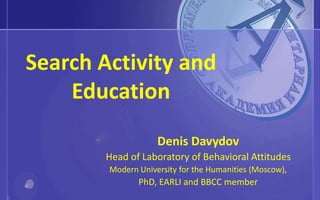
Search Activity and Education: Developing Critical Thinking and Tolerance through Individualized Learning
- 1. Search Activity and Education Denis Davydov Head of Laboratory of Behavioral Attitudes Modern University for the Humanities (Moscow), PhD, EARLI and BBCC member
- 2. Education for Sustainable Development Envisioning Critical thinking and Reflection Tolerance for controversy Systems thinking Search Activity
- 3. Four types of behavior Search Activity Stereotyped Behavior Chaotic Behavior Renunciation of Search
- 4. Search Activity N.Bogdanov-Bel’skiy “Calculations without notes” - No a definite forecast of results. - Constant monitoring of these results. Fantasizing Fight Escape Rethinking Planning
- 5. Search activity role: • body's protect from deteriorative factors; • determines the progress of civilization; • foundation enterprise and civic activity; • can be used for forecasting educational difficulties and for optimization of education; • appropriate for developing individual educational project planning; • unrealized SA leads to aggression and destructive social processes, like a revolution or terrorism.
- 6. Education must develop the search activity, and at the same time, provide the means for its implementation.
- 7. Stereotyped Behavior –definite forecast of the results Chaotic Behavior (panic) – behavior without feedback between activity and its outcome
- 8. Renunciation of Search • learned helplessness (M.Seligman
- 9. Fedor Reshetnikov “The bad mark again”
- 10. Education Why Search Activity Concept? • Individual educational project planning. • Optimization of education in general. Test Retest We can measure the education quality!
- 12. Compare behavioral attitudes according to the gender The Russian sample (2009-2012; D.Davydov).
- 14. Difference in behavioral attitudes between in groups of various training types.
- 15. Balance of logical and imaginative thinking Showing the relativity of the truthand controversial approaches Elimination of the generality of failures Experience of errors, elimination of generality of achievements. Encourage spontaneity and initiative Learning tasks that have more than one true solution Learning tasks when the student himself have to find the methods of solution Emotional contact and supporting self-esteem Having interests outside of school
- 16. If the search activity attitude predominant Self-dependent choice of form and content of education. Learning tasks that require transformation assimilated ways to solve problems in unfamiliar situations ("problem teaching"). Presentation of training tasks in a tight "form of competition", as a challenge. The high level of complexity of tasks that students might not solve from the very first time. Creative tasks with fuzzy goals, Hands-Off or Delegating Management style. Prevent the perception of achievement as a "final", show the perspective and motivation to further overcome the difficulties. Preventing antisocial behavior by engaging in outside school activities.
- 17. If the SB is the predominant attitude In the initial stages of learning not to use the training tasks requiring a high autonomy. The first stage learning - tasks with intended clear result and with familiar methods. Begin with low uncertainty in the training tasks (situations), then the uncertainty should increases. The constant reliance on the successful results obtained. The second stage - the choice of methods for achieve the intended in advance result. Gradual implementation problem-based learning, developmental tasks requiring creativity and self-development methods of operation.
- 18. If the CB is the predominant attitude Providing less freedom to choose their own educational paths. In the initial stages of learning not to use the training tasks requiring a high autonomy. Limited use of problem-based learning. In the case of failures and trouble in learning - to give clear instructions to implement the of training tasks and to overcome the problems. The development of reflexivity. The emphasis in training on introspection activities and the ability to substantiate the choice of tools and methods of activity.
- 19. If the passive is the predominant attitude Support for self-esteem, make training task forms which reduces the risk of fall self-esteem in case of failure. Convincing that the errors in solving educational problems - it's OK. The constant reliance on the any successful results obtained. In the initial stages of learning not to use the training tasks requiring a high autonomy. Elongation period of study for reducing academic load. Stimulation of activity outside of school. It is important to create a positive experience in solving difficulties. Gradually apply the exercises to strengthen right hemispheric (or imaginative) thinking. Stimulation hobbies of an art. Development of emotional relationships with other pupils and teacher.
- 20. Next goals 1. Development toolkit 2. Intercultural study 3. Test differences: first and last year students, gender, regions and subjects group, academic advancements group etc. 3. Testing BASE questionary in learning practice
- 21. Our other areas: - subjective well-being of students; - Social factors of intelligence (n= 9 000); - healthy behavior attitudes of students.
- 22. The Search Activity Concept It makes Education for Sustainable Development goals more clear It suggests a clear paths to achieve these goals It gives to evaluate compliance education with the goals of ESD
- 23. Thank you for your attention! Any questions? Denis Davydov ddavydov@hotmal.co.uk